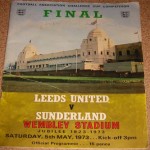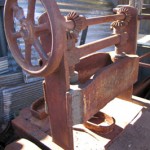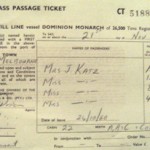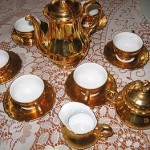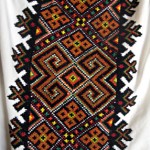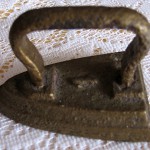(nee Lafiosca)
Italian
Grassano, Italy
Naples, Italy in May 1950
Melbourne on 14 June 1950
House on banana farm at North Tumbumglum, Tweed Shire (northern New South Wales).
Farm work at North Tumbulgum, mainly in vegetable crops.
Raising a family of six children and ongoing farm work. Later purchased a banana farm at Urliup.
Papa died when I was six years old. It was hard for Mum. She had a baby three months old. He just died suddenly, bronchitis, and died in four days. My oldest brother was in the war. Dad had built this beautiful home that he never paid for, because he died.
[Later] Mum said, “Oh, I think I’ll sell the house”. I said, “You not sell Daddy’s house!” I wanted those debts paid off. And I was about 14 then. She said, “You like to do it?” “Yes,” [I answered]. She said, “You know what? I trust you”. We worked, me and poor Mum, very hard. I got to do it, not I want to do it. We used to plant wheat, we used to plant hay, we used to plant chick peas; we plant everything. We have a big orchard – everything, grapes, everything.
[My husband Bernadino (Barry) and I] were born in the same town and we lived in the same street. And when he went in the war and the army, I was only a young girl. And when I met him again after he come back from the war, I was 22. After about two months he want to marry me. He said, “I love you so quick, I want to marry you straight away”. We got married. We were happy. We been poor, but we were happy.
Why did we come to Australia? Well, I’ll tell you now. My husband come home from the war and poor Barry had no money. We had two children in two years, it was hard. We make it three years in Italy, but couldn’t make it any more because Barry had no job.
Catherine’s eldest daughter, Fay (Euphemia): (Barry had been a Prisoner of War on a banana farm in the Tweed Valley in northern NSW during World War Two.) What happened is that this farmer wrote to Dad and said that if he wanted to come back with his family and work over in Australia, he would pay for their trip over. And then when they got over here, they actually worked to pay back the money for the trip that he paid for. So this farmer brought Dad, Mum and the two boys, and I was on the way, and they were on the boat for 30 days. Alan Fitzpatrick – he was the farmer at North Tumbulgum – gave them a little house. Mum worked in the vegetables and Dad in bananas.
Catherine: When I left my village I was disappointed because I was pregnant. I wanted to have my baby in my town. Barry said, “No. Good people in Australia. You’ll be happy”. I trust him. I said, “Alright, my husband”. Well, it was hard at first; very, very hard.
Joe, [my eldest son], sat in the hot coals, in the fire when he was a little baby, in Italy. And he didn’t get burnt. So because he was saved and didn’t get burnt we put him in the St Anthony’s clothes, he’s the patron saint [for protecting children]. So he stayed in those for a certain time, from Italy to Australia. I washed it before the Mass in the boat. The priest said, “Don’t wash it, keep it blessed. I blessed your son.” We still have it.
We reached Melbourne. We had no money. The poor baby, [Frank], cried. Joe cried, Frank cried, I was starving – I cried too! I was pregnant, I wanted something to eat. I lost a stone and a quarter on the boat. I was 42 kilo when I got there. Still, I make it! We met this Italian lady – she was a beautiful woman. She saw this poor kid crying, she said, “What’s wrong. Why are you crying?” I said, “We are all hungry”. We left the boat at five o’clock in the morning. It was 12 o’clock and we had nothing to eat. This woman came close and she said in Italian, “You come with me”. She took me to a restaurant. I said, “I have no money, I can’t come with you”. “I’ll pay for it,” she said. She paid for lunch; me and the two boys. Barry didn’t want to come. He was starving but didn’t want to come. We left about 2 o’clock. We caught the train to Sydney [and] found a priest who could talk Italian. He called our name and said, “You come with me”. He took us for tea. We waited for the train until about ten o’clock at night and we reached Murwillumbah [in northern NSW] about nine o’clock in the morning.
Catherine’s youngest daughter, Rose: (Catherine had no formal schooling and knew no English when she came to Australia.) Mum had never left the village; Dad had been around the world. Grassano was a very different looking place to here. It’s vastly different. It was quite an amazing journey. Within the space of six weeks she had been on trains and buses and boats. And she got to Murwillumbah and into the back of a truck and to North Tumbulgum.
Catherine: I used to read their lips, the women in the vegetable fields, when they were talking. I used to put it in my head. When I used to go home – Barry could speak a fair bit – I said to Barry, “Get the book (dictionary)”. I see what she said, that lady, for me. By that I learned English – it is true. I worked about ten years with them. They were lovely women.
We had a trunk with all our stuff [from Italy]; they reckoned the trunk had been lost. We didn’t have it for about 13 months! Later we got the trunk back. Everything was broken, it got smashed. The clothes were all rotten. So we had nothing. One day I see this woman, Mrs Britton, at the front door. She had a beautiful box. There was a pink dress inside. I want to say to the woman, “What do you want?” [But] she kissed me, she hugged me, she said, “That’s for bubby.”
We couldn’t afford a lot of things – we got to pay the farmer back because he loaned us the money to come. The vegetables, we used to bring home all the time. The baker, he helped us a lot to sell all our vegetables. Buffalo [one of only two neighbouring Italians at the time] had plenty of chooks. Here, I have no chooks, nothing. One morning I went to the shed and I found this box full of chickens. I said to the neighbours, “Oh my God, who leaves these chickens?” They told me, “Mrs Grippo, Mr Buffalo left the chickens”. Another day I saw this man called Alby. He come with two cows up the hill. He said to me, “That’s your cow”. Just like that! I wanted to say something to him. He said, “No, that’s your cow. Have you got a bucket? Milk the cow, I’ll show you”. Barry came home, and he went to get the saucepan, and it was all full of milk. Oh my God, I laughed my head off.
Afterwards we bought the farm from [Alby] at Urliup. Me and Barry cut down with the cross saw the timber for our house. One tree in one day. We start at eight o’clock in the morning and finish at six o’clock. I plant the tomato, we plant the banana; the ground is beautiful. I’m 82, nearly 83. I [still] grow everything.
Barry, he liked Australia. It was really great for my children. That’s why we came here. And now, not great for me, because I lost Barry, that’s all. It’s hard; 25 years, nearly 26 years I’ve been on my own. But my children have done well. All my children have done well. I have prayed that my children would work like their mum and dad. I’m very proud.
Interviewed by:
Kath Prichard and Jo Kijas, Tweed River Regional Museum
Sadly, Kath Prichard passed away suddenly and unexpectedly in August 2007.
Kath, one of the Museum’s youngest and most committed volunteers, had dedicated many hours to researching the history of the people and places of Tweed. This story is the result of her gentle perseverance and wish to contribute to the Tweed community.


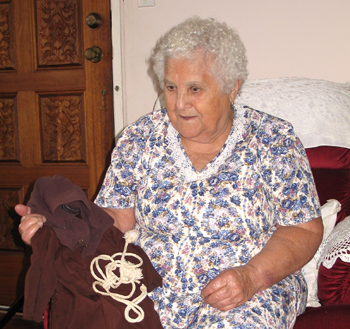

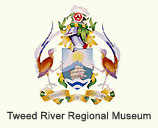
!["Joe sat in the hot coals, in the fire, when he was a little baby, in Italy. Because he was saved and didn’t get burnt, we put him in the St Anthony’s clothes - he's the patron saint [for protecting children] - from Italy to Australia. I washed [the suit] before Mass in the boat."](../../../cms/wp-content/uploads/2008/10/suit-150x150.jpg)
